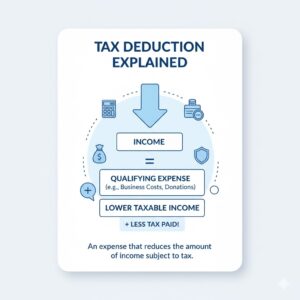Running an SME in Nigeria means every naira counts. The last thing you want is to overpay tax simply because you missed deductions you qualify for. Many Nigerian businesses overlook big savings opportunities because they assume compliance is all about paying tax when in fact it’s also about reducing it legally. In this article you’ll learn about the top business tax deductions Nigerian SMEs often miss, why they matter, and how you can claim them properly.
Featured Snippet Answer
Many Nigerian SMEs miss out on valuable tax deductions such as staff training, office supplies, travel costs, and professional fees. Claiming these expenses correctly helps reduce taxable income and maximize profit. Using smart tools like Zaccheus ensures accurate tracking, documentation, and automatic identification of deductible expenses.
What Is a Tax Deduction in Nigeria?
A tax deduction is any expense that your business can subtract from total income before calculating tax.
Under Nigerian tax law, deductible expenses must be wholly, reasonably, exclusively, and necessarily incurred in generating business income.
Examples include:
-
Office rent
-
Utilities
-
Staff training
-
Equipment purchases
-
Professional services
When claimed correctly, these deductions reduce your taxable income, helping you keep more of your hard-earned profits.

Why Many SMEs Miss Out on Deductions
Most small and medium businesses in Nigeria lose out on legitimate deductions due to:
-
Poor record-keeping — missing receipts or undocumented expenses
-
Lack of tax awareness — not knowing what qualifies
-
Mixing business and personal expenses
-
Failure to use accounting or AI tools like Zaccheus for tracking and categorization
Missing these deductions means paying more tax than you legally owe.
Top Business Tax Deductions Nigerian SMEs Often Miss
Let’s look at the most overlooked deductions and how you can claim them confidently.
1. Training and Professional Development
Money spent on employee training, certification courses, or skill workshops can be deducted.
Example: A ₦250,000 digital marketing course for your staff is tax deductible if it enhances business performance.
2. Travel and Transportation Costs
Business-related trips, fuel, taxi fares, and vehicle maintenance for official use qualify as deductions.
Maintain travel logs with trip purpose, distance, and receipts.
3. Office Equipment and Supplies
Laptops, printers, desks, and software subscriptions are deductible.
For large purchases, you can claim depreciation through capital allowances under Nigerian law.
4. Internet and Communication Bills
Business phone calls, data plans, and Wi-Fi bills count as legitimate deductions.
Track which portions are business-related if shared with personal use.
5. Marketing and Advertising
Expenses on social media ads, Google Ads, radio spots, website design, or printed flyers all qualify.
Marketing fuels your growth, and it’s deductible.
6. Professional and Consultancy Fees
Payments to accountants, auditors, or legal consultants are deductible if directly related to your operations.
7. Capital Allowances (Depreciation)
Big-ticket assets like vehicles, factory equipment, or computers qualify for capital allowance.
Keep asset registers with purchase date, cost, and business use percentage.
8. Bad Debts
If a customer debt becomes uncollectable after genuine attempts, you can deduct it as a bad debt (with documentation).
How to Claim Tax Deductions Properly
Follow these steps to ensure your claims are legitimate and accepted by the FIRS:
-
Keep Accurate Records: Store receipts, invoices, and payment proofs digitally.
-
Separate Business and Personal Finances: Use a dedicated business bank account.
-
Automate Expense Tracking: Tools like Zaccheus categorize and log expenses automatically.
-
File on Time: Submit annual returns with complete documentation.
-
Work With a Tax Advisor: They help you identify missed deductions and stay compliant.
Compliance Tips for Nigerian SMEs
-
Businesses under ₦25 million annual turnover may enjoy tax exemptions.
-
Keep expense evidence for at least 6 years in case of audits.
-
Avoid claiming personal expenses — it can trigger penalties.
-
Regularly review your financials using Zaccheus to spot claimable deductions early.
How Zaccheus Simplifies Tax Tracking for SMEs
Zaccheus makes it easy for Nigerian SMEs to track, categorize, and claim deductions automatically.
Here’s how it helps:
-
Smart Categorization: Every transaction is auto-tagged under valid tax categories.
-
Receipt Matching: Upload receipts, and Zaccheus matches them with transactions.
-
Expense Insights: See deductible vs non-deductible spending instantly.
-
Audit-Ready Reports: Download FIRS-compliant summaries in one click.
-
Result: No missed deductions. No tax stress.
FAQs About Tax Deductions for Nigerian SMEs
1. What are examples of tax-deductible expenses in Nigeria?
Common examples include rent, utilities, salaries, travel, training, and marketing expenses provided they are business-related.
2. Can startups in Nigeria claim tax deductions?
Yes. Even early-stage startups can deduct eligible expenses before profitability, helping reduce future tax liability.
3. How do I prove my expenses to the FIRS?
Maintain receipts, invoices, payment evidence, and contracts. Zaccheus simplifies this by storing and linking them automatically.
4. Are capital allowances the same as deductions?
Not exactly. Deductions apply to everyday expenses, while capital allowances cover long-term assets like vehicles and machinery.
5. What happens if I miss a deduction this year?
You can carry forward some deductions to the next tax year, depending on the category and FIRS rules.
Conclusion + Call to Action
Every naira saved through legitimate tax deductions strengthens your business’s growth potential.
By understanding and claiming these often-overlooked deductions, you can reduce your tax bill and reinvest those savings into scaling your business.
Stop letting hidden deductions slip away.
Start tracking smarter with Zaccheus , the easiest way for Nigerian SMEs to automate bookkeeping, discover tax savings, and stay compliant.
Sign up with Zaccheus today and start keeping more of what you earn.